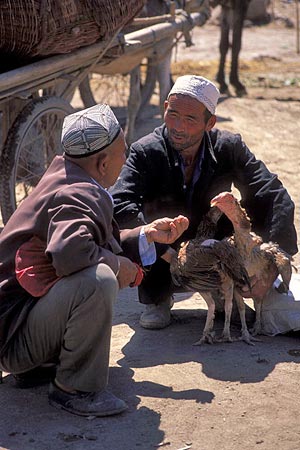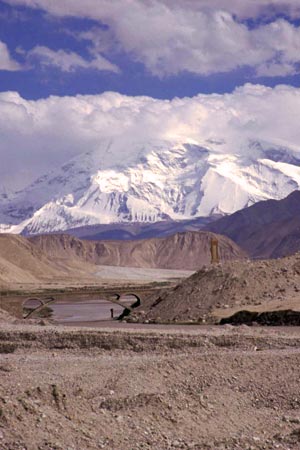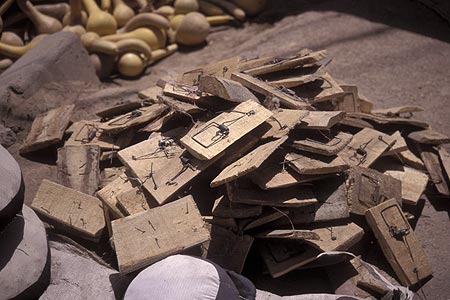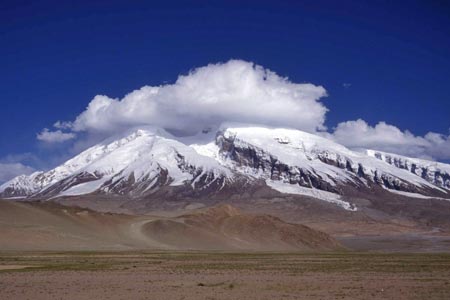The Road to Pakistan
| It is Tuesday morning, and I am alone with an empty bus. We both happen to be in Kashgar, an old Silk Road town in far western China. I had come thousands of miles to visit a market located here. Not just any market, mind you – as far as old markets go, the Kashgar Sunday Market is the Super Bowl. For over a thousand years, traders from the surrounding countries of Central Asia have assembled for a frantic day of buying and selling. With goods ranging from hand-made mousetraps and two-humped camels to the latest Sony electronics, I witnessed merchants speaking commerce in dozens of different languages. | "The game of life is not so much in holding a good hand as playing a poor hand well.” H.T. Leslie |
On the other six days of the week, Kashgar is just a little town in a big desert. I had plans to trek to K2 in Pakistan. To get there, I expected to take my bus over the Karakoram Highway. Built with the help of the Chinese, the KKH, as it is known, crosses some of the highest and most demanding terrain in the world. The literal high point of the trip is Khunjerab Pass, at an elevation of 15,528 feet. The bus trip from Kashgar to the town of Sost in Pakistan takes two days, covers a distance of 317 miles, and costs about 30 US dollars.
My bus is scheduled to leave this morning. To make sure I don’t miss my ride, I arrive early. With nothing else to do, I sit on my backpack, next to my empty bus, waiting for a sign that I am in the right place.
I relax as others begin to arrive with their possessions.
One serious-looking man singles me out, walks up, and demands my passport and ticket. No uniform. No badge. But he acts like he’s in charge, so I hand over my documents. He browses them and then orders me to put my backpack on the roof. He tells me there is a one-bag rule. I can bring only one bag inside the bus with me and everything else must go on the roof.

While traveling, we are frequently faced with decisions like this. In opposition to our lives back home, on the road we sometimes have to decide when it is prudent to break the ”rules.” On the one hand, I have an official giving me an order. On the other hand, I imagine my backpack, with all of my belongings, flying off and rolling down some cliff. I hesitate, check my locks, and then grudgingly hand my bag up to the boys on the roof of the bus. I climb down and find my now-smiling official waiting with his hand out. He says I must pay one US dollar for each bag on the roof.
A crowd of 30 passengers has assembled around the bus, waiting for the door to open. Each passenger has boxes and bags of stuff piled all around them. With my new understanding of the rules, I climb on top of the bus to retrieve my bag. I scramble down and get back into the crowd.
At last, the door of the bus opens, and like a dam breaking, the crowd surges forward. It is a pushing match, but as I meld with the mob, I am sucked into the bus.
Once inside, the passengers scramble for seats. People are tossing blankets, bags of food, pots, pans, and empty suitcases through the windows. The stuff is piled haphazardly onto seats near the back of the bus. The few backpackers on board head to the rear and attempt to organize the mess to recover places to sit.
The passengers comprise a diverse mix - Han Chinese, Pakistani men with baseball caps, Chinese Tajik traders, covered Muslim women, and six backpackers. I take a seat next to an old Chinese Tajik man. Our eyes meet and we appraise each other. No words are needed - simultaneously, we both break out with broad smiles.
The bus begins to move. I feel that familiar sense of anticipation – I’m on the road again. I look forward to Pakistan and new adventures awaiting me there.
We stop at a roadside restaurant for lunch. Using my broken Mandarin, I ask the bus driver what time the bus will leave. He replies, “After we eat.” Of course, I mutter to myself.
The backpackers sit down at one large table with some of the other passengers. Each group carries on conversations in their own language, as if the other groups didn’t exist. After our short lunch, we all pile back into the bus. We leave the flat terrain and begin the climb into the mountains. We are officially on the KKH. The air begins to cool. The bus winds through incredibly steep canyons as we follow a ”road” that would challenge a Humvee. The bus groans in first gear as it bumps along through dry creek beds.

I gaze at the scenery that is so different from the muted deserts of the past month. The road follows a raging river with the color and consistency of chocolate milk. Jagged peaks rise straight up into a cloudless blue sky. I am mesmerized and find myself sticking my head out of the window like a dog.
Late in the afternoon, we stop at Kara Kol Lake, high in the mountains, and three of the backpackers get off the bus. The place is green, the lake a deep blue, but a persistent cold wind blows. There is an overpowering sense of isolation. Their bags are dumped out the window. They wave goodbye as if being sent to prison. I am relieved that I am not getting off here.
The sun has long since set when we arrive at a small town called Tashkurgan. It’s the Central Asian version of Fort Apache – a lonely outpost, hundreds of miles from the closest Chinese city. The bus stops at a hotel that the Lonely Planet guidebook describes as filthy. The passengers all go in - They obviously haven’t read the poor reviews. The two remaining backpackers and I decide to look for something better.
The town seems deserted. We walk down the ”main” street and pass a few locals sitting outside on chairs. They stare at us with intensity, but without revealing their emotions.
We arrive at the Pamir Hotel, which is described by the guidebook as the nicest place in town. The Chinese staff is gathered around a small black-and-white TV, watching a World Cup soccer match. We quickly negotiate a room at a reasonable price - the staff wants to get back to the match after all. The three of us share a relatively nice dorm room with a working television set. We congratulate ourselves.
Then, we discover the bathrooms. The toilet flushes intermittently. The floor is wet and the bathroom looks like it hasn’t been cleaned in a decade. I have to hold my breath. After I wash up, I notice that the back of my shirt is soaked. Some unidentified liquid has been dripping from the ceiling. Unfortunately, the source of this mystery is another bathroom on the floor directly above. I fear this unknown liquid but realize the only way to solve this mystery is to smell my shirt. I decide that this knowledge is not worth the price.
The next morning, we skip the bathroom, and head back to the bus. We go through another minor panic since no one else is waiting. Luckily, the bus is still there. Last night, risking more embarrassment, I asked the driver when the bus would leave. He told me the bus would leave at 10AM Beijing time. It is 9:30 AM. We sit and wait.
The rest of the passengers suddenly materialize as if beamed down from the Starship Enterprise. We participate in the ritual push to get onto the bus, and I head to the back. I find my Tajik seatmate has saved my place. He greets me with a warm smile and offers me the window seat.
The bus begins to move. We go about a half-mile and stop. It is the Chinese customs checkpoint. Everyone and all of our belongings must get off the bus. The boxes on the roof need to be taken down.
We file into the customs building. The Westerners are quickly shuffled through. I look back at the rest of the passengers and their piles of goods. The Chinese customs officials look very stern. I am grateful that for once I’m not the focus of their attention. The officials dissect every box and bag.
I am standing in front of the last Chinese official. He is examining my passport. Despite my travel experience, I get nervous going through customs. I tell myself to relax. The official speaks in Mandarin. I say my most used Chinese phrase, “Wo bu dong” - I don’t understand. He reveals a slight grin and asks me the same question speaking much slower this time. Now I understand. He has asked about my ethnic background. I answer in Mandarin that I am Japanese-American. He nods, stamps my passport, hands it back, and says goodbye. Relieved, I say thank you.
The backpackers meet and wait on the other side. The rest of the passengers take almost an hour and a half to get through. The bus comes around, and again we rush the bus to get our seats. I am looking forward to seeing the views at the top of the pass.
We begin the climb. The bus drones on, alternating between first and second gear as we wind up a steep road. The motor begins to make funny noises. We stop. Steam pours out of the front of the bus. I hear simultaneous groans and curses in different languages. The bus driver gets a toolbox out and begins to work under the bus. This may take some time.

Bored, I try to sleep, but the altitude makes it hard. We are over 13,000 feet and after spending weeks at sea level, I have a slight headache and feel like I am in slow motion. I soon give up.
I turn my attention to my seatmate and offer him some pistachios that I picked up in Kashgar. He shares some of his bread. For the first time, we try to communicate. He doesn’t speak any English and very little Chinese. He hands me his passport and wants to look at mine. Using a combination of Mandarin, English and mime, I find out that he and his friends are Chinese Tajiks bringing goods to Pakistan for trade. They are fascinated by my guidebook and so I hand it to them.
Four hours go by, we don’t seem to be making any progress. The driver continues to work under the bus. What could he be doing down there? None of the other passengers appear concerned. There are no other vehicles on the road. It is getting cold. I wonder if we’ll be spending the night in the bus.
The driver has packed up his tools. I am optimistic. We all pile back into the bus. The engine starts. We begin to move. We go about 100 yards and stop. It is 6:00 PM. It must be time for plan B, whatever that may be.
A couple of trucks go by without stopping. A Chinese army truck stops and a few soldiers get off. They converse with the bus driver. While one soldier stays behind, the others get back in the truck and continue on.
An empty minibus on its way up to the pass stops. Our bus driver talks to the minibus driver. Everyone starts to rush off our bus. They throw their belongings out the windows. They crowd around the minibus door. The soldier starts screaming at everyone, but few can understand him. He lets a couple of Han Chinese women onto the bus. With empty seats, the minibus leaves. Everyone gets back on our bus.
The driver tells all the men to get off our bus. We all pile out. The bus starts up and begins to move. We walk. The Chinese soldier yells at me to go faster. I feel like a prisoner of war. Plan B must be to walk to Pakistan. It is windy, getting colder, and starting to snow. The bus has stopped. This obviously isn’t working. We all climb back on to the bus. We wait.
Another empty minibus comes and stops. It has seats for 16 people. In a repeat performance, the crowd explodes out of our bus. They are frantically throwing their luggage out of the windows and rushing onto the minibus. Expecting to be disappointed again, I am too casual. I suddenly realize that this is plan B.
We climb up on the roof of the minibus and tie down our bags. Half the seats are taken up with passenger belongings. We ask people to take their stuff out of the minibus to free up seats. They ignore us at first. After a little cooperation, we get over 30 people, blankets, pots, pans, and empty suitcases on the bus. There is no room to move. The passengers are contorted as if we are playing a game of Twister in a phone booth.
The minibus begins to move. In 15 minutes that felt like hours, we arrive at the final checkpoint. The Chinese border officials walk up. I prepare myself for the ritual. Everyone is supposed to get out of the bus. They peer through the windows, quickly decide they don’t want the hassle, and wave us through.
We finally arrive at the pass. It is snowing. It is very dark, but the scenery doesn’t seem to matter to me anymore. A couple of kilometers further, we are greeted by a “Welcome to Pakistan” sign. We are met by a couple of Pakistani border guards with AK-47 rifles. They force themselves onto the bus and look around. Now what?

The answer comes when three other border guards climb on the bus. They want to hitch a ride down. We now have over 34 people in this minibus designed for 15. Two people are sitting in the driver’s seat. It's pitch black and we are headed down some of the steepest parts of the KKH. I try to relax. I remind myself that I have been through worse, although I have a hard time remembering when.
We head down the steep, winding road, picking up speed. As far as I can tell, the road is only a little wider than the bus. If I could stick my arm out the window, I would be able to touch the solid rock wall from which the road was cut. On the other side, I can’t see anything but darkness and assume there is a straight drop-off to the river far below.
The windshield begins to steam up from all of the passengers. The guy sharing the driver’s seat tries to use his hand to clean the window. He’s bumping the driver. He’s making the window worse. The driver continues on unfazed, but there is no way he can see the road. The backpackers yell at him to open a window. The guy continues to wipe the window with his hand. The driver finally opens a side window and it clears up quickly.
I relax too soon. Our driver begins to talk to some of the people in the bus. Not usually a bad thing, but this driver is turning around to make eye contact. He doesn’t slow down. Again we yell at him. He shrugs us off.
Our driver gives orders to one of the passengers to collect money. They announce they want 300 rupees per person, about five US dollars. We spend the next fifteen minutes shuffling our positions so he can collect money from each of us.
One of the backpackers doesn't want to pay. He feels he has already paid for this trip. I understand the principle, but question his judgment. The driver slams on the brakes. We screech to a halt. We are so packed inside the bus, that no one gets hurt. The driver refuses to go on until the passenger agrees to pay. Words are exchanged and we move on. More words are exchanged and we stop again. Finally a compromise is reached and we are off again.
We continue down the road. I am sitting down, but cannot move. There is no room. I have my pack on my lap. My butt is falling asleep and getting sore. I cannot get comfortable. I am sitting over the engine. I feel like I’m sitting on a frying pan.
We stop four times at various checkpoints along the way. At one of the checkpoints, we three backpackers are told to go into the office. We struggle to squeeze out of the bus. The office is one bare room with a desk and no lights. There are three people sitting in the dark. Using our flashlights, we write our names and passport numbers into a big logbook. The official looks through our passports. I show him the Pakistani visa. He doesn’t care. He takes back the passport. I want to hurry. I am worried that the bus and my pack will leave without us. He finally finds whatever he is looking for and we are allowed to leave.
We squeeze back onto the bus. Sensing our frustration, the passengers tell us there are no other checkpoints. I am hopeful. We are on the home stretch. We pass a sign that says it is four kilometers to Sost, our destination. I have missed the scenery but am grateful to finally be done with this trip.
As I finish this thought, the engine stops and the bus begins to coast. Now what? He restarts the engine. It starts and then stalls. We slow down and come to a stop. You’ve got to be kidding. The minibus has run out of gas.
The passengers get off the bus. The driver says there is oil available five minutes away. The driver’s assistant grabs an empty soda bottle and runs off. The three of us get off the bus and huddle.
“How far is it to Sost?”
“The last sign said four kilometers.”
“You can’t trust Pakistani signs.”
“Should we walk, what do you think?”
“Do you think it’s really only four kilometers?”
“I can’t take this anymore.”
“I am out of here.”
It is decided. We will take matters into our own hands. We retrieve our bags. We are walking the rest of the way. The driver pleads with us:
“You can’t go on your own.”
“The oil will be here soon... five minutes.”
“It is too far to walk for you.”
“It is not allowed.”
Despite his protests, we leave. It is 10:00 PM. We calculate that we should be in Sost within an hour. It is pitch black. We take out our flashlights. We walk for close to an hour but no town. I start to silently question the wisdom of our decision.
A motorcycle comes by. We stop him and he tells us the town is only twenty minutes away, but my morale is low. I have been tested during the trip. I try to convince myself that at least we are making progress.
We finally see the lights of a village. We arrive in Sost. The immigration official is in a tent sleeping next to the last gate. We wake him up. I prepare for more problems. He tells us to go into town, and come back in the morning.
We arrive at a hotel, get a room, and shower. Clean and feeling energized, we head to the restaurant for a late dinner. It is a little before midnight. We talk like old friends. First reliving our ordeal but soon moving on to other topics.
A half-hour later, our bus arrives. As the weary passengers file by, we smile and toast to our small victory with orange Fanta sodas.
